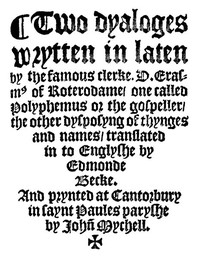Two Dyaloges (c. 1549) by Desiderius Erasmus
"Two Dyaloges (c. 1549)" by Desiderius Erasmus is a collection of dialogues that explore themes of morality, hypocrisy, and the nature of faith, written during the early Renaissance period. This work serves as a critique of contemporary religious and social practices through a satirical lens, making it relevant for readers interested in the intersection of religion, ethics, and human behavior in historical contexts. In the dialogues, two characters, Poliphemus and Cannius, engage
in witty exchanges that delve into the superficiality of outward appearances and the true essence of faith. Poliphemus, the gospeller, presents himself as a devout bearer of the gospel while displaying behaviors that contradict Christian teachings. Cannius challenges Poliphemus on various points, questioning his authenticity and adherence to the true spirit of the gospel. Through their conversation, Erasmus highlights the disparity between external piety and internal morality, using humor and irony to persuade readers to reflect on their own beliefs and actions. The second dialogue further examines the significance of names and reputation, contrasting genuine virtue with the vain pursuit of social status. Overall, the book encourages a deeper understanding of true moral integrity beyond mere appearances. (This is an automatically generated summary.)
Read or download for free
| How to read | Url | Size | |||
|---|---|---|---|---|---|
| Read now! | https://www.gutenberg.org/ebooks/14500.html.images | 78 kB | |||
| EPUB3 (E-readers incl. Send-to-Kindle) | https://www.gutenberg.org/ebooks/14500.epub3.images | 387 kB | |||
| EPUB (older E-readers) | https://www.gutenberg.org/ebooks/14500.epub.images | 386 kB | |||
| EPUB (no images, older E-readers) | https://www.gutenberg.org/ebooks/14500.epub.noimages | 90 kB | |||
| Kindle | https://www.gutenberg.org/ebooks/14500.kf8.images | 446 kB | |||
| older Kindles | https://www.gutenberg.org/ebooks/14500.kindle.images | 433 kB | |||
| Plain Text UTF-8 | https://www.gutenberg.org/ebooks/14500.txt.utf-8 | 67 kB | |||
| Download HTML (zip) | https://www.gutenberg.org/cache/epub/14500/pg14500-h.zip | 368 kB | |||
| There may be more files related to this item. | |||||
Similar Books
About this eBook
| Author | Erasmus, Desiderius, 1469-1536 |
|---|---|
| Title |
Two Dyaloges (c. 1549) Wrytten in laten by the famous clerke, D. Erasm[us] of Roterodame, one called Polyphemus or the gospeller, the other dysposyng of thynges and names, translated in to Englyshe by Edmonde Becke. |
| Note | Reading ease score: 79.0 (7th grade). Fairly easy to read. |
| Credits |
Produced by David Starner, Louise Hope and the PG Online Distributed Proofreading Team |
| Language | English |
| LoC Class | PA: Language and Literatures: Classical Languages and Literature |
| Subject | Dialogues, Latin (Medieval and modern) -- Translations into English |
| Category | Text |
| EBook-No. | 14500 |
| Release Date | Dec 28, 2004 |
| Most Recently Updated | Dec 19, 2020 |
| Copyright Status | Public domain in the USA. |
| Downloads | 194 downloads in the last 30 days. |
| Project Gutenberg eBooks are always free! | |

